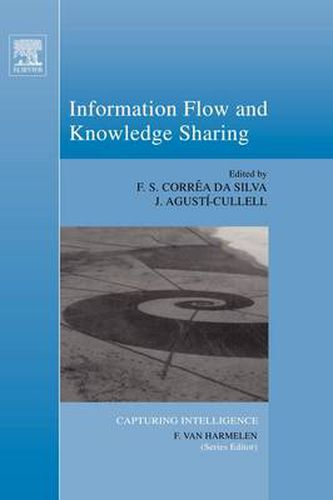Readings Newsletter
Become a Readings Member to make your shopping experience even easier.
Sign in or sign up for free!
You’re not far away from qualifying for FREE standard shipping within Australia
You’ve qualified for FREE standard shipping within Australia
The cart is loading…






Except from the Foreword The stated aim of the book series Capturing Intelligence is to publish books on research from all disciplines dealing with and affecting the issue of understanding and reproducing intelligence artificial systems. Of course, much of the work done in the past decades in this area has been of a highly technical nature, varying from hardware design for robots, software design for intelligent agents, and formal logic for reasoning.
It is therefore very refreshing to see Information Flow and Knowledge Sharing. This is a courageous book indeed. It is not afraid to tackle the Big Issues: notions such as information, knowledge, information system, information flow, collaborative problem solving, and ontological reasoning. All of these notions are crucial to our understanding of intelligence and our building of intelligent artificial systems, but all too often, these Big Issues are hidden behind the curtains while the technical topics take center stage.
AI has a rich history of philosophical books that have chosen a non-standard structure and narrative. It is nice to see that the authors have succeeded into combining a non-standard approach to deep questions with a non-standard format, resulting in a highly interesting volume. Frank van Harmelen, Series Editor
Excerpt from the Introduction Our interest is to promote, through a better and deeper understanding of the notions of information and knowledge, a better and deeper critical understanding of information technology as situated in the full range of human activities, assuming as a principle that this range of activities cannot be properly appreciated when it is reduced to the simplified means-end schema proposed by Technology. We invite the reader to build his/her own points of view about these notions, considering our propositions as a starting point for a critical analysis and discussion of these points. With that, we believe we are contributing to a better understanding of the impact of technology - and particularly of Information Technology - in everyday life.
Flavio Soares Correa da Silva, Jaume Agusti-Cullell
$9.00 standard shipping within Australia
FREE standard shipping within Australia for orders over $100.00
Express & International shipping calculated at checkout
Except from the Foreword The stated aim of the book series Capturing Intelligence is to publish books on research from all disciplines dealing with and affecting the issue of understanding and reproducing intelligence artificial systems. Of course, much of the work done in the past decades in this area has been of a highly technical nature, varying from hardware design for robots, software design for intelligent agents, and formal logic for reasoning.
It is therefore very refreshing to see Information Flow and Knowledge Sharing. This is a courageous book indeed. It is not afraid to tackle the Big Issues: notions such as information, knowledge, information system, information flow, collaborative problem solving, and ontological reasoning. All of these notions are crucial to our understanding of intelligence and our building of intelligent artificial systems, but all too often, these Big Issues are hidden behind the curtains while the technical topics take center stage.
AI has a rich history of philosophical books that have chosen a non-standard structure and narrative. It is nice to see that the authors have succeeded into combining a non-standard approach to deep questions with a non-standard format, resulting in a highly interesting volume. Frank van Harmelen, Series Editor
Excerpt from the Introduction Our interest is to promote, through a better and deeper understanding of the notions of information and knowledge, a better and deeper critical understanding of information technology as situated in the full range of human activities, assuming as a principle that this range of activities cannot be properly appreciated when it is reduced to the simplified means-end schema proposed by Technology. We invite the reader to build his/her own points of view about these notions, considering our propositions as a starting point for a critical analysis and discussion of these points. With that, we believe we are contributing to a better understanding of the impact of technology - and particularly of Information Technology - in everyday life.
Flavio Soares Correa da Silva, Jaume Agusti-Cullell